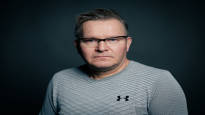Rosa Lappi Seppälä did not take a step back when defending her right to coach in Saudi Arabia. A completely different moral code is required from sports than from business life, writes Pekka Holopainen.
Pekka Holopainen sports reporter
“Saudi Arabia is the largest market in the Middle East, a G20 country and Finland’s most significant export destination in the region. Saudi Arabia is the largest ICT market in the Middle East and one of the world’s leading countries in the use of 5G and 6G networks. The Vision 2030 program and its numerous mega-investment projects offer Finnish companies significant opportunities.”
That’s the catch from the website of the Ministry of Foreign Affairs can be found in the bulletin about the Finnish business and export opportunities of the sunken fossil energy state, which, for example, even small Finland has utilized to the tune of 300 million euros in 2021, and in its recent history even up to arms exports.
But arms exports did not cause such a mass and moral panic as the commitment of a Finnish football coach for one year to the Saudis taking his first steps as the head coach of the women’s national team. Of course, it’s quite a different thing to teach the inside pass on the training ground than to ship weapons to the peninsula to be used in a neighboring country’s conflict.
Perhaps it’s no wonder that he stopped washing at the turn of the year Rosa Lappi-Seppälä said in an interview with Urheilu that he experienced quite a bit of confusion about the situation. At the same time as his well-paid, but not extravagantly paid work was harshly criticized in the Finnish media, in Saudi Arabia a large number of Finnish professionals do their work under this moral radar cover, for example in the fields of construction technology and healthcare.
Bad PR tool
Among Finland’s most famous large companies, for example, Kone and Konecranes have competed for a significant foothold in the country. The undersigned also got his first cassette recorder in 1978. It was brought by a relative who made up a huge account as a forced laborer in the exotic oil port of Jeddah.
It was difficult for the Finnish coach, who wandered in the margins of the local media even as a PR tool for the kingdom, to hold his own. That role is probably reserved for such gentlemen as Cristiano Ronaldo, Karim Benzema, Jon Rahm or Dustin Johnson.
Criticism of the Arab world in liberal Western countries is largely, and justifiably, based on a critical examination of the position of women. About the workforce in Saudi Arabia is Finland’s ambassador to Riyadh Anu-Eerika Viljanen 37 percent are women, and gender segregation, especially in big cities, has decreased significantly. The pace of change is even dizzying for a diplomat.
Right or duty?
Of course, this kind of development and its acceleration also includes women’s right to goal-oriented competitive sports, which has been a matter of course for us in Western countries for decades. On the other hand, launching women’s goal-oriented competitive sports projects requires Western know-how, because it cannot be found in our country due to our short history.
A female lawyer could see that coaching, developing and educating female athletes in Saudi Arabia was not only Rosa Lappi-Seppälä’s right, but even an obligation.
It must have been quiet.
An excellent example
The treatment of Rosa Lappi-Seppälä and a few other Finnish sports personalities who have had an impact on the Arabian Peninsula is excellent, for example, for what everything extra Finnish society wants to put in the sports bag: at least debunking the exercise and overweight bomb, national defense fitness, teaching manners, integrating immigrants and, of course, raising the moral front.
A Finnish engineer is respected for designing the elevator shafts of a Saudi skyscraper, but at the same time, a sports person who practices his profession and earns a living is viewed through a completely different spectrum.
Finland is probably the only country that finances various ethical issues in sports always looking for a registered association much more supportive than their own best athletes.
